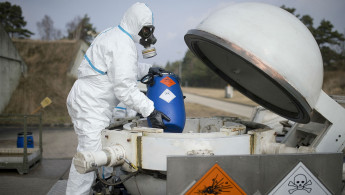IS could be producing chemical weapons warns watchdog
There are 'extremely worrying' signs that IS is producing its own chemical weapons and has already used them in Iraq and Syria, an international chemical weapons watchdog has warned.
2 min read
A suspected IS gas attack on the Iraqi town of Taza killed three children [Getty]
A global watchdog has warned there are "extremely worrying" signs that the Islamic state group [IS] could be making chemical weapons and may have used them already in Iraq and Syria.
The head of the Organisation for the Prohibition of Chemical Weapons [OPCW], Ahmet Uzumcu, said on Tuesday that his body's fact-finding teams have found evidence of the use of sulphur mustard in attacks in the two countries.
"Although they could not attribute this to IS... there are strong suspicions that they may have used [chemical weapons]," Uzumcu told AFP.
"Secondly the suspicions are that they may have produced it themselves, which is extremely worrying," Uzumcu said on the sidelines of a three-day conference at the OPCW's Hague-based headquarters.
"It proves that they have the technology, know-how and also access to the materials which might be used for the production of chemical weapons," Uzumcu said.
US special forces captured an IS operative in Iraq last month who was a chemical weapons expert, who is thought to have formerly worked for Saddam Hussein's regime.
CIA director John Brennan in February said that IS fighters had the capability to make small quantities of chlorine and mustard gas.
Uzumcu did not point to any specific attacks, but last month IS mounted a deadly gas attack against Syrian troops at a government-controlled airbase outside the divided eastern city of Deir ez-Zour, according to Syrian state media.
The attack was the latest in a string of suspected mustard gas attacks by the militants in Syria and neighbouring Iraq.
On March 9, a suspected IS gas attack on the Iraqi town of Taza, south of Kirkuk, killed three children and wounded some 1,500 people, with injuries ranging from burns to rashes and respiratory problems.
While chemical agents allegedly used by IS so far have been among its least effective weapons, the psychological impact on civilians is considerable.
A total of 25,000 people fled their homes in and around Taza last month, fearing another attack.
Uzumcu also urged vigilance by other nations to guard against any chemical attacks outside Syria and Iraq.
"The international community should be very vigilant to such threats and cooperate further to prevent such attacks from occurring elsewhere," Uzumcu said.
The head of the Organisation for the Prohibition of Chemical Weapons [OPCW], Ahmet Uzumcu, said on Tuesday that his body's fact-finding teams have found evidence of the use of sulphur mustard in attacks in the two countries.
"Although they could not attribute this to IS... there are strong suspicions that they may have used [chemical weapons]," Uzumcu told AFP.
"Secondly the suspicions are that they may have produced it themselves, which is extremely worrying," Uzumcu said on the sidelines of a three-day conference at the OPCW's Hague-based headquarters.
"It proves that they have the technology, know-how and also access to the materials which might be used for the production of chemical weapons," Uzumcu said.
US special forces captured an IS operative in Iraq last month who was a chemical weapons expert, who is thought to have formerly worked for Saddam Hussein's regime.
CIA director John Brennan in February said that IS fighters had the capability to make small quantities of chlorine and mustard gas.
Uzumcu did not point to any specific attacks, but last month IS mounted a deadly gas attack against Syrian troops at a government-controlled airbase outside the divided eastern city of Deir ez-Zour, according to Syrian state media.
The attack was the latest in a string of suspected mustard gas attacks by the militants in Syria and neighbouring Iraq.
On March 9, a suspected IS gas attack on the Iraqi town of Taza, south of Kirkuk, killed three children and wounded some 1,500 people, with injuries ranging from burns to rashes and respiratory problems.
While chemical agents allegedly used by IS so far have been among its least effective weapons, the psychological impact on civilians is considerable.
A total of 25,000 people fled their homes in and around Taza last month, fearing another attack.
Uzumcu also urged vigilance by other nations to guard against any chemical attacks outside Syria and Iraq.
"The international community should be very vigilant to such threats and cooperate further to prevent such attacks from occurring elsewhere," Uzumcu said.
Agencies contributed to this report.





 Follow the Middle East's top stories in English at The New Arab on Google News
Follow the Middle East's top stories in English at The New Arab on Google News


